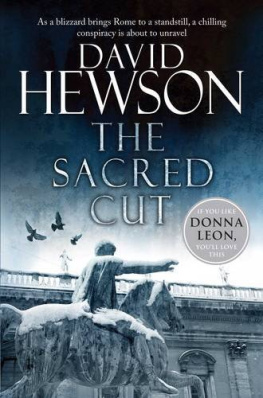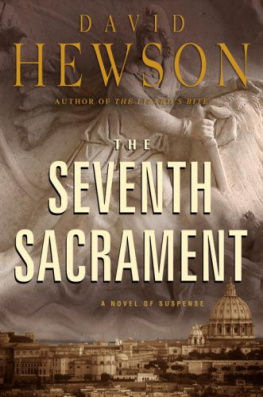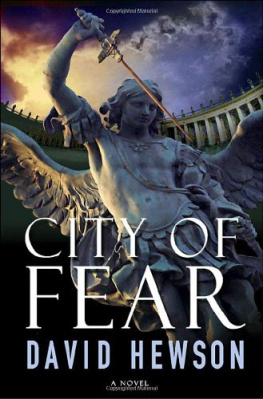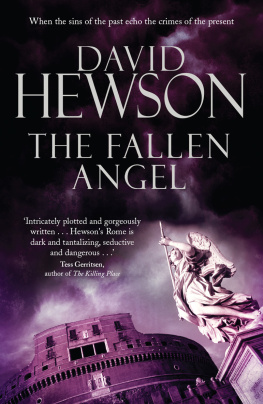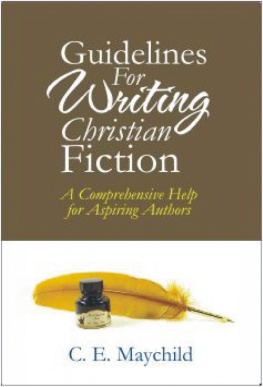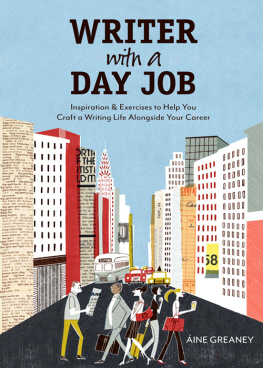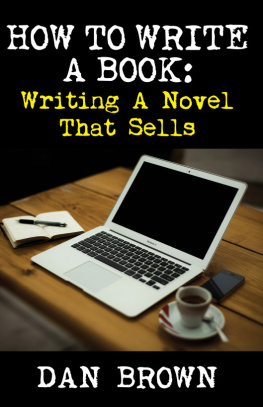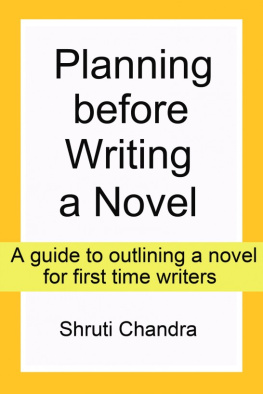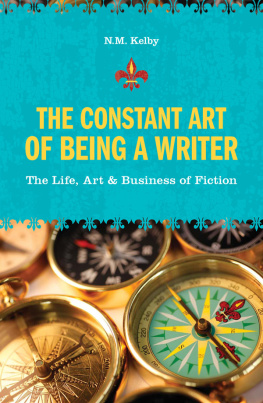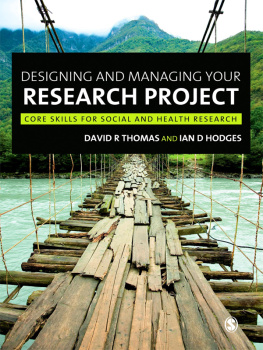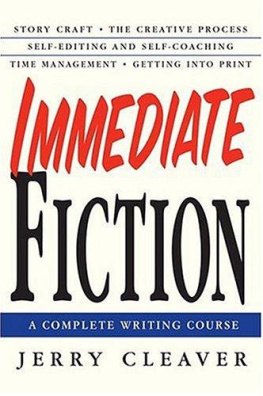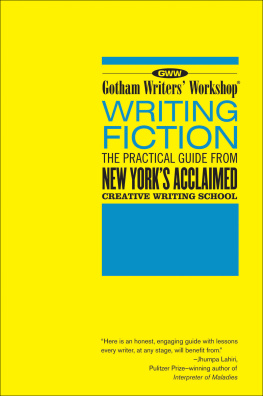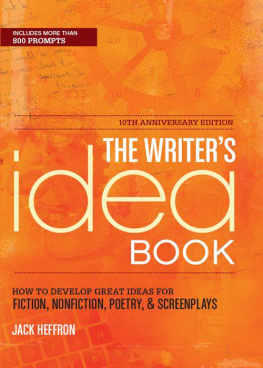WRITING
A User Manual
A PRACTICAL GUIDE
TO THE CRAFT OF PLANNING,
STARTING AND FINISHING A NOVEL
David Hewson

BLOOMSBURY PUBLISHING PLC
1 3 5 7 9 10 8 6 4 2
First published in 2012
Bloomsbury Publishing Plc
50 Bedford Square
London WC1B 3DP
www.bloomsbury.com
Copyright David Hewson 2012
Foreword Lee Child 2012
David Hewson has asserted his rights
under the Copyright, Designs and Patents Act, 1988,
to be identified as the author of this work
A CIP catalogue record for this book is available
from the British Library
PB ISBN: 978 1 408 15742 8
EPUB ISBN: 978 1 408 15741 1
Available in the USA from Bloomsbury Academic & Professional,
175 Fifth Avenue/3rd Floor, New York, NY10010.
www.BloomsburyAcademicUSA.com
Typeset by Country Setting, Kingsdown, Kent CT14 8ES
Printed and bound by CPI Group (UK) Ltd, Croydon CR0 4YY
This book is sold subject to the condition that it shall not,
by way of trade or otherwise, be lent, resold, hired out,
or otherwise circulated in any form of binding or cover
other than that in which it is published and without
a similar condition,
including this condition, being imposed on the subsequent purchaser.
Contents
1
Plan
In order to write Books
You have to Read Books
2
Write
3
Deliver
I shouldnt be writing this foreword. I dont believe in how-to books. Not for writing. Im not sure writing can be taught. I believe novels need to be instinctive. I think writers need to shut their eyes and write exactly what and how they want to. Because that way their books will be organic, living, breathing, vital, full of energy, full of integrity. I think thats the only route to success. You cant do it by committee. I think that to want to do something, but to hesitate because Lee Child or someone else does it differently, is the route to certain failure. My how-to book would be all of three words long: Ignore all advice.
But.
But writing is also a job. Its a trade. Its a profession. Maybe it shouldnt have rules, but it does have manners. And conventions. And realities. And processes, and different stages within those processes. And tricks. Getting the words on the page isnt easy. You have to make them your words, and your words alone, but some ways will save you a little time and frustration, and some ways will cost you a lot of both.
And once the words are on the page, its a whole new ballgame. There are blind alleys, and ways to avoid them. There are elephant traps, and ways to sidestep them. Theres praise, and ways to parse it. Theres criticism, and ways to respond to it. And ways not to. Once the words are on the page, you step out of the office and into the jungle. You need a guide.
You need David Hewson.
I know David pretty well. Weve sat side by sardonic side through publication dinners, on conference panels, at committee meetings, and with our elbows propped on bars. Weve set the world to rights many times over. There are three things you need to know about old Hewson: his bullshit meter is second only to mine. He loves the business to death, but is the least starry-eyed writer youll ever meet. And he was a working journalist, and (perhaps therefore) the most professional and down-to-earth guy youll ever meet.
You should listen to him. I do, all the time. You should listen long and hard. You should absolutely be prepared to ignore what he says if youre not convinced, but I think you will be convinced. By most of it, anyway.
LEE CHILD
New York, 2011
This is a guide to practical craft not cerebral art. It is aimed at the ambitious budding author more interested in finishing a book than allowing it to linger in the purgatory of a never-ending work in progress. Success and failure in any writing project frequently depend upon matters deemed too mundane to be worthy of discussion in authorial circles. Yet the real-world challenges how to approach a manuscript, to manage research, to fix the right point of view represent important and recurring obstacles every writer, novice or professional, must overcome.
All too often students and teachers alike focus almost exclusively on the intellectual question of what to write and ignore the more immediate yet equally pressing one how? As my title suggests, this book is designed to be a manual offering some plain-language insights into the everyday mechanics of creating a book from hazy idea to finished manuscript. Sound working habits and an understanding of the technical structure of fiction are no substitute for creative talent. But the right tools and approaches can free the imagination to work on the most difficult task of all: telling a compelling story. Years of talking to students at writing schools around the world have shown me that projects frequently fail not because of some lack of inspiration but through the more humdrum issues of poor time management, faulty working habits and plain ignorance of some of the basic tenets of the writing craft. These are the principal issues I intend to approach here.
Art is fundamental in the development of characters and themes and the creation of a compelling story sufficiently gripping to hold the attention of the reader. I have doubts about how much these elusive talents can be taught beyond the obvious. The best tutors for the subtle skills of narrative have been around us since we were children, on bookshelves, in libraries, alive in our own minds. Theyre the stories weve come to love ourselves and usually the reason we want to write in the first place. Every creative aspect of fiction is laid bare in the pages of the books we have absorbed as readers over the years. Better to study the work of the masters in their original form and work out for yourself what makes them great than to have someone else try to explain their achievements for you.
What can be learnt is the ability to think about writing, to understand how to control the various processes that go into the making of a book, from planning to story development, research to revision and, finally, delivery in a form which will catch the eye of an agent or publisher.
A first-time author may not be a professional in name, but theres no reason why he or she cannot be proficient in execution. Nothing guarantees failure more than tardy delivery, shoddy presentation and badly proofed manuscripts betraying the most basic of structural and textual errors. Those who come to judge your work will be looking for motives to reject it more readily than reasons to set another hopeful on the long and expensive path to publication. They will receive no better justification than the obvious whiff of amateurism. Authors, new and old, make mistakes. It is the inexcusable and the avoidable that those judging your efforts will find hard to overlook.
Budding author or professional, you should endeavour to adopt the unsung virtues of the practical side of the craft and seek to maximise your time, energies and skills in order to get a fighting chance of reaching the goal: a finished book of publishable quality. An organised writer, in control of his or her fate as much as any author can be, will negotiate the rocks ahead more competently than one who simply sets sail on the first gust of wind. He or she is also far better prepared to rescue a project from the wreckage, a prospect few busy authors will manage to avoid at least once in their career.
A significant part of the battle to become a writer lies in discovering and adopting the combination of working methods that suits your own temperament, personal circumstances and ambitions. Books make harsh taskmasters. An author has few chances for success and many for failure. Its important to maximise the former and minimise the latter.


